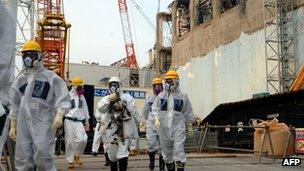Fukushima nuclear plant: Radioactive water leak found
- Published

IAEA experts have suggested that the cleanup at the nuclear plant could take up to 40 years
Radioactive water is leaking from a storage tank at Japan's Fukushima plant, its operator says.
Nuclear plant operator Tokyo Electric Power Company (Tepco) said a worker discovered the leak on Wednesday.
On Tuesday, Tepco also announced that it had found radioactive caesium in ground water around the plant.
The plant was damaged in an earthquake and tsunami in 2011, and has been hit by several leaks and power failures in recent months.
Hundreds of huge water tanks have been constructed at the site of the plant to store contaminated water used to cool melted reactors cores.
In a statement, external, Tepco said the contaminated water was leaking from the storage container at the rate of one drop every three to four seconds.
While the company said the leak was small, it follows an admission on Tuesday that ground-water around the plant is contaminated.
Correspondents say this suggests water has been leaking from the plant or storage tanks into the soil - something the company previously said had not happened.
All of this is going to make it even more difficult for Tepco to convince local fishermen that it is safe for Tepco to start pumping ground water from around the plant in to the ocean, the BBC's Rupert Wingfield-Hayes in Tokyo reports.
The plant suffered three power failures in five weeks earlier this year. A leak of radioactive water from one of the plant's underground storage pools was also detected in April.
In April, the UN nuclear watchdog IAEA said the "reliability of essential systems" at the site should be improved.
On 11 March 2011, an earthquake and tsunami crippled the plant, causing meltdowns at three nuclear reactors.
Engineers have since stabilised the plant but years of work lie ahead to fully contain the disaster and tackle its effects.
- Published22 April 2013
- Published9 April 2013
- Published5 April 2013
- Published20 March 2013
- Published11 March 2013